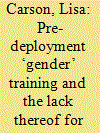| Srl | Item |
| 1 |
ID:
144321


|
|
|
|
|
| Summary/Abstract |
In the area of peacekeeping training, Australia has a reputation of promoting ‘best practice’ internationally. Training for Australian police peacekeepers has been described by the United Nations as ‘one-of-a-kind’ and ‘a world-class model of best practice’. This article provides a case study of how gender training is conducted, and how ‘gender’ is understood from a critical feminist perspective. This article focuses only on the pre-deployment training stage and is informed by confidential interviews with staff from the Australian Federal Police and the Australian Defence Force, as well as observing training in 2013–14. The findings suggest that the training is inadequate because it is not carried out for all peacekeeping personnel, despite international and national requirements to do so. In addition, the findings suggest that ‘gender’ is understood in a very limited way that does not problematise power relations between the sexes and is only covered as a way of understanding the peacekeeping context, and not in relation to the attitudes and behaviours of peacekeepers themselves. This raises the question of whether and how other troop-contributing countries conduct the training and to what standard, given the documented problems of Australia's supposedly ‘best-practice’ training.
|
|
|
|
|
|
|
|
|
|
|
|
|
|
|
|
| 2 |
ID:
177854


|
|
|
|
|
| Summary/Abstract |
Over the past two decades, the international Women, Peace and Security (WPS) agenda has established a commitment to increase the participation of women in matters of peace and security, to ensure the protection of women's rights, and to include gender perspectives in conflict prevention. The WPS agenda foresees a number of measures to make peacekeeping more gender-responsive, including training uniformed peacekeepers on gender. These policy commitments date back to the year 2000, and have instigated the development of training materials and the institutionalization of training at regional and national levels. This article examines these training mandates, asking: What is the scope and nature of gender training for peacekeepers? How is gender understood to operate in peacekeeping? A review of international and national policy commitments demonstrates that training uniformed peacekeepers on gender has become a significant transnational practice. An examination of these mandates and training guidance reveals that training discourse establishes a normative understanding of gender that is focused primarily on vulnerability to sexual violence, and that frames gender as a question of skills and capacities rather than political investments or moral values. However, differences in localization demonstrate that gender training could be and sometimes is understood more expansively.
|
|
|
|
|
|
|
|
|
|
|
|
|
|
|
|